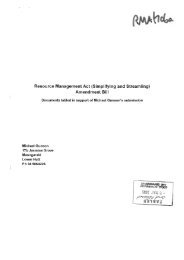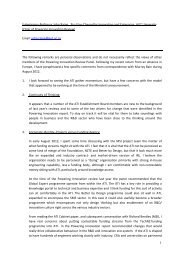Full paper text [PDF 3515k] - New Zealand Parliament
Full paper text [PDF 3515k] - New Zealand Parliament
Full paper text [PDF 3515k] - New Zealand Parliament
Create successful ePaper yourself
Turn your PDF publications into a flip-book with our unique Google optimized e-Paper software.
32<br />
Health Passport<br />
The evaluation phase of the HDC-led<br />
initiative of implementing the Health<br />
Passport in <strong>New</strong> <strong>Zealand</strong> hospitals has<br />
been completed. The Health Passport is<br />
a document designed to assist nursing,<br />
medical and support staff to understand<br />
the care, communication and support<br />
needs of people with disabilities.<br />
The HDC has received numerous responses<br />
from consumers strongly in support of<br />
the Health Passport as they consider it<br />
will assist them in receiving safe and<br />
appropriate health care during a hospital<br />
visit. Responses from consumers who have<br />
used the passport indicated that:<br />
• it assisted them in having a better<br />
overall care experience<br />
• it helped their health care worker to<br />
understand their needs<br />
• they were saved the frustration of having<br />
to continually explain their health<br />
problems, as all their relevant information<br />
was written in the Heath Passport<br />
• communication with the health<br />
professional was made easier because<br />
relevant information had already been<br />
written in the Health Passport.<br />
Multi Agency Group<br />
(MAG)<br />
The HDC is a member of the MAG, a<br />
coalition of agencies that work together<br />
to reduce discrimination and promote<br />
social inclusion and the rights of people<br />
with experience of mental illness and<br />
addiction. The group works at a national<br />
level to lead change within a holistic view of<br />
mental health. In July 2011 MAG published<br />
Measuring Social Inclusion – A Baseline<br />
Report, which was produced by the Mental<br />
Health Commission. The report provides a<br />
high-level summary of social inclusion of<br />
people with experience of mental distress<br />
and/or addiction in <strong>New</strong> <strong>Zealand</strong> and<br />
provides the basis for the monitoring of<br />
social exclusion outcomes. The report has<br />
found people with symptoms of mental<br />
distress feel less included in society than<br />
other <strong>New</strong> <strong>Zealand</strong>ers at major cost to<br />
them and their communities. The work<br />
plan for the year included the development<br />
of a resource to support and guide social<br />
inclusion for people with experience of<br />
mental illness and addiction.<br />
Accessibility and<br />
responsiveness of<br />
HDC’s services<br />
HDC provides information for the disability<br />
community on its website through weekly<br />
updates from the sector. The information<br />
offered ranges from an inquiry into the use<br />
of <strong>New</strong> <strong>Zealand</strong> Sign Language, updates<br />
on the Convention Coalition monitoring<br />
report, useful information for Asian, migrant<br />
and refugee communities, to the Maori<br />
Disability Action Plan. Two of HDC’s staff<br />
are learning <strong>New</strong> <strong>Zealand</strong> Sign Language.<br />
HDC employed two more disabled people<br />
during the last year. A student from Kelston<br />
School for the Deaf completed a work<br />
experience placement in the HDC offi ce.


![Full paper text [PDF 3515k] - New Zealand Parliament](https://img.yumpu.com/11267192/34/500x640/full-paper-text-pdf-3515k-new-zealand-parliament.jpg)



![Full evidence text [PDF 8908k] - New Zealand Parliament](https://img.yumpu.com/14025494/1/184x260/full-evidence-text-pdf-8908k-new-zealand-parliament.jpg?quality=85)
![−3 JUN 2009 IRELEASED] - New Zealand Parliament](https://img.yumpu.com/12829724/1/185x260/3-jun-2009-ireleased-new-zealand-parliament.jpg?quality=85)


![Full evidence text [PDF 9k] - Parliament](https://img.yumpu.com/7938085/1/184x260/full-evidence-text-pdf-9k-parliament.jpg?quality=85)





